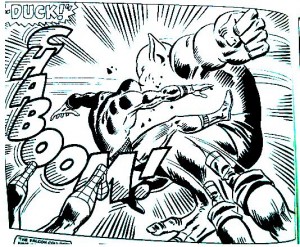Thursday. We worked on Blending drills. Consonant clusters weren’t yet perfect, and we peeked ahead at prefix clusters with ‘r’ (‘brand’, ‘trend’) which were pretty rough too. But we’ll keep drilling, and move forward only as quickly as H. can develop automaticity on each skill.
We finished the ‘Vampire Breath’ Goosebumps. H. seems captivated that he can actually read, but he is is in grade 8 and finds the actual story totally lame. He wants to read our new Marvel Comics, and we start into one after the break.
Comic books have long been regarded as the enemy of literacy. That’s not really the case. Reading is reading, but the ‘literacy’ required for reading comic books is quite different than for reading text. All you get from the word-bubbles is dialog, everything else , who is talking, where they are, and what they are doing, has to be ‘read’ from the pictures. As a result, comics tend to be dialog-heavy with lots of talking-to-yourself. There are also conventions to learn, such as the order to read the bubbles, dotted bubble lines mean whispering, and so on.
I’m quite happy with these comics. There are far fewer words per page, but I can reasonably ask H. to read most of them (I help out with a villain who talks with a French accent.) The vocabulary is harder than Goosebumps, but the words tend to compounds and Latin origins that H. can break down (like hovercraft and Uranium), and the drawings often help with explaining what they mean. This comic was first published in 1952 so there are archaic expressions, but it is pretty solid practice for word recognition.
I expect H. to struggle with comprehension, and yet I am still surprised how little he understands from these comic books. We proceed frame-by-frame, discussing the words and the story. I explain what a trans-dimensional gateway is (of course), explain the back-story of Spiderman’s job at the Daily Bugle, and point out that seemingly insignificant comments, like ‘Peter Parker’ thinking his boss is acting strange, are always foreshadowing and we must attend to them.
 But H. is struggling with the most basic elements of the story. Here’s an example: Spiderman and Captain America are battling a pair of powerful villains and not doing well. In these two frames, our besieged heros are back-to-back, and the two villains launch a new attack from either side. As we explore these frames, I map out everyone’s positions and point out that the good guys are cooking up a plan. I know what’s coming and do my best to prepare H. for it.
But H. is struggling with the most basic elements of the story. Here’s an example: Spiderman and Captain America are battling a pair of powerful villains and not doing well. In these two frames, our besieged heros are back-to-back, and the two villains launch a new attack from either side. As we explore these frames, I map out everyone’s positions and point out that the good guys are cooking up a plan. I know what’s coming and do my best to prepare H. for it.
 Then we come to the next frame, and I yell ‘DUCK’, pointing out that word in the top left corner. I ask H. what just happened, he has no idea. “Maybe they are fighting?” I recap their positions and point out Spiderman’s and Captain America’s legs in this frame. H. now gets it, they jumped out of the way and the two bad guys hit each other, a huge smile on his face.
Then we come to the next frame, and I yell ‘DUCK’, pointing out that word in the top left corner. I ask H. what just happened, he has no idea. “Maybe they are fighting?” I recap their positions and point out Spiderman’s and Captain America’s legs in this frame. H. now gets it, they jumped out of the way and the two bad guys hit each other, a huge smile on his face.
But how can he not have understood this himself? H. doesn’t have a learning disability, he’s a smart quick-witted kid. But he is a brand-new reader and is completely missing the literacy skills that we take for granted. He has to learn everything from scratch, and because he is in a terrible hurry, we must teach it to him in the most explicit, direct way we can. We must not assume, and must not skip. And we need to invest the hours, there is no quick shortcut. But the rewards will be enormous.
On very little evidence, I begin to think we should teach both text and graphic novels concurrently (perhaps one before the break, one after). Word recognition is only our first challenge, we also have to fire up the imagination and teach how to build a mental image of the story. Maybe learning the image-language of comics will transfer to plain text.
This is my last scheduled day with H., although I’m hoping I will work with him again after my holiday. Julianne will start with him tomorrow, other volunteers are standing in the wings.
We continued working with Haroun during the summer of 2015, five days a week for two months (we didn’t blog every day). By the end of the summer he was an independent reader. It was thrilling to watch.
If you are interested, that series of blogs starts here.. There are a few extra posts because WordPress’s ‘Next Article’ follows all blogs in chrono order; just skip over them.



Leave a Reply